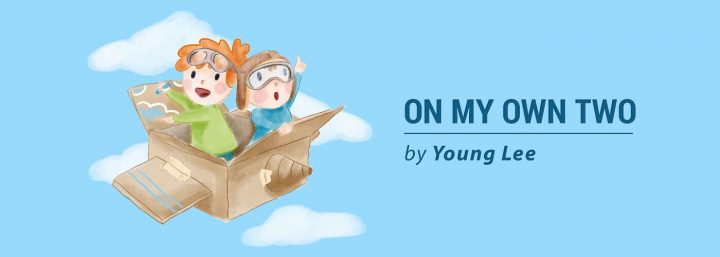No, You Aren’t a ‘Savage’ for Being Unable to Return That Cart

Column by Young Lee
About a year ago, my sister and I went to an arts and crafts store. Upon entering, I instinctively wanted to steer the shopping cart, an offer my able-bodied friends and acquaintances often appreciate.
But before I could get a complete sentence out of my mouth, I remembered that both my sister and I have Charcot-Marie-Tooth disease (CMT). As CMT-ers, we actually cherish the opportunity to man the cart during especially long shopping trips.
For many CMT-ers, shopping carts aren’t bulky burdens that keep us from freely roaming the aisles. Instead, for many of us in the disabled community, carts are a welcome way to get additional support while still blending in. In fact, shopping carts are so beloved in our community that many of us gravitate toward them even if we’re only picking up a handful of things at the store.
So when discussions about a “Shopping Cart Theory” became trendy on social media, this memory came to mind. While I agree with the sentiment of the theory, I can’t get behind its encouragement of prejudice and its narrow-minded assumption that we live in a world where everyone is equally privileged and able-bodied.
For those unfamiliar with the viral Shopping Cart Theory, it asserts that the act of returning a shopping cart is a good litmus test of a person’s character. The logic being that if someone fulfills a societal expectation that has few rewards or punishments, a person demonstrates that he or she is capable of a certain level of self-governance.
While elements of this “theory” aren’t exactly new, the now-viral post continues that if a person abandons their shopping cart after using it, they are “no better than an animal, an absolute savage who can only be made to do what is right by threatening them with a law and the force that stands behind it.”
Now, although this statement may be a bit hyperbolic for the sake of humor, it illustrates disdain that some disabled people fear they may face when they are unable to return their shopping carts — whether that’s due to fatigue or pain or a multitude of other possible reasons.
Granted, abandoning carts in the parking lot is not a trivial thing. Both the accessibility of shopping centers and the burden of retail workers are multi-faceted problems.
Abandoning carts does not make retail jobs easier and it does not give retail workers job security. I understand that many folks who confront others who abandon their shopping carts in the parking lot are generally well-meaning people seeking to help retail workers and other shoppers.
And yet, while I think working to make shopping centers friendlier and more accessible for both the disabled community and retail workers is worth discussing, whether or not we should strive to act with empathy and be slow to judge others is not. It’s in this aspect that the Shopping Cart Theory fails.
***
Note: Charcot-Marie-Tooth News is strictly a news and information website about the disease. It does not provide medical advice, diagnosis, or treatment. This content is not intended to be a substitute for professional medical advice, diagnosis, or treatment. Always seek the advice of your physician or other qualified health provider with any questions you may have regarding a medical condition. Never disregard professional medical advice or delay in seeking it because of something you have read on this website. The opinions expressed in this column are not those of Charcot-Marie-Tooth News or its parent company, Bionews Services, and are intended to spark discussion about issues pertaining to Charcot-Marie-Tooth.






Whitedove
Totally me. Cart in and out of store to the truck keeps me balanced. I push it to front of truck so next car can get in that space. But that's where it stays
Lynn Wolff
Totally me also. As a 80 year old, I use the cart to maintain balance and walk better. I truly try to return the cart; however, I have observed that the cart return areas very often are not near the handicap parking areas.
Roberta
I was verbally attacked for leaving my cart (securely) at a curbside next to the first disability parking space, as I have arthritis in my knee and back, with knee replacement, and I'm 70. This man took the cart and put it right behind my car, mind you this was a big guy probably in his late 30s to early 40s. So I encountered both disability and elder abuse. What's happening to us as a human race?
Mavis Jean Symonds
I have recently been diagnosed with Charcot-Marie -Tooth, a condition I am sure 99%of our population are ignorant of, not because of choice but because they simply have never heard of it. I think informing the businesses where we shop of the difficulties people in our situation
face when getting shopping from the store to the car usually in the few disability parking spaces available. I think educating retail stores of the issues people like us face would be beneficial to both businesses and to the people suffering from this disability. Big business and even smaller businesses are very clever at creating strategic plans to cope with issues that when worked on would benefit their business while assisting those of us who have to deal with issues such as this.
Paul
I don’t use handicap spots , nor do I abandon carts. Despite having CMT, weighing 389lbs and having scoliosis a fused foot, have torn rotator cuffs and misc other issues.
It’s just lazy to ditch carts, either plan on returning them or have everything delivered to your home. Or expect others to judge you.
Damien
This is the most snowflake thing I’ve ever read. Stop making excuses for people who lack moral character. They account for the majority of people who just don’t care enough to bring their cart back to the corral.
Lance
The shopping cart theory doesn’t apply to you if you physically can’t take it to a cart corral. This article is the similar to saying a blind person sucks at reading books, or a mute person sucks at public speaking.
Andrew P.
I think the point of the shopping cart theory was a that if the stakes, dangers or pains were nothing and there was nothing but the the right thing to do of the choice that could affect your decision, then not undertaking it means you value the right thing to do at nothing. The shopping cart theory isn’t a perfect one, a fully abled person still has to walk to push the cart back, but it stands on the idea of what you value your morality. If you have any reason not to push the cart rather than you’re lazy, then the theory doesn’t apply because you’ve lost the conditions for it to apply.
Stuart
You intended to provide a flaw in the shopping cart theory, but instead proved it further.
Disabled people often use the shopping cart to help support themselves while blending in. Doesn’t it stand to reason that you would help your fellow disabled people by returning the shopping cart so they too can also use it? Especially since you know how valuable it is to them?
Basically, what you’ve said here is that you know how useful a tool said shopping cart is to other disabled people, but actively refuse to pay forward it’s benefits.
That... is an unfortunate mark on your character. To know how useful something so common is but then refuse to offer it to anyone else who might need it—possibly even for the same reason you needed it—is the very test the shopping cart theory proposes, and you fail it.
CJ
Not returning the cart to a corral is actually a bigger help for disabled people. I look for carts in the parking lot and park by it so I can easily grab it and have help walking in the store.
AJ
Seems like a whole bunch of excuses. If you can take care of the cart, then don't take one in the first place. It doesn't take much wind for that cart to become a land missle.
James
The theory is a simple moral dilemma, will you finish all things involved with your task or will you leave a mess for others to clean up? Do you live the rest of your life this way?
Sienna
As a disabled person I can’t stand when people leave shopping carts strewn all over the place. It forces me to move them out of the way to give me space. Just because you’re handicap it doesn’t mean you get the right to be rude to others. Put the damned cart away where it belongs.
Dawn
I don't understand why grocery stores refuse to put cart corrals near the handicapped parking spaces. If I want to put my cart back, I literally have to walk twice as far as anybody who is not parking in a handicap spot. I either have to walk all the way back to the store and then all the way back to my car or I have to walk all the way to the cart corral and all the way back to my car. Somebody who is parked next to the cart corral only has to go that far. They don't have to walk all the way back. Essentially it would be easier for me to not park in handicap spot if I wanted to put my cart away when I was done.
Most days I do not have what it takes to do either of those things. I have to use an electric cart in the store because the pain in my legs is so intense when I walk. So walking all the way back into the store or the cart corral and then walking all the way back to my car causes me too much pain. I can't do it. My daughter is one of those people that absolutely hates it when people don't put their carts away. But she gets the handicapped parking thing. If she is with me when I am shopping she makes me go sit in the car while she loads the groceries in the car and puts the cart away. The stores need to put cart corrals next to the handicapped spots if they want us to put the carts away. Because I'm just not going to do it. I have that spot for a reason.